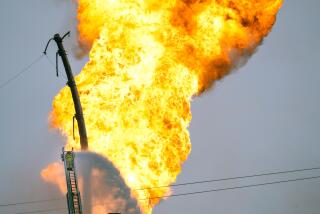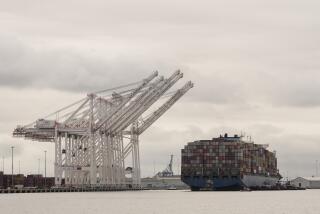Houston Ship Channel partially reopens to traffic
One of the nationâs busiest seaports partially reopened to ship traffic on Tuesday after it had been closed because of a weekend oil spill in the waters near Houston, Coast Guard announced.
Traffic resumed flowing through the Houston Ship Channel about 1 p.m. local time, Coast Guard Petty Officer Manda Emery told the Los Angeles Times. There was no estimate when the channel will be fully reopened or how long it will take to clear the backlog of more than 100 vessels waiting to get through.
The channel was closed Saturday after a collision between an oil barge and a ship led to a spill of about 168,000 gallons into the waters used by craft serving refineries.
âThe cleanup operations progress is to the point that there is minimal danger of contamination to the commercial maritime traffic and allowing limited transit during daylight hours,â Coast Guard Capt. Brian Penoyer said in a prepared statement. âThis is an important accomplishment for every person working this response.â
More than 71,000 feet of containment boom have been deployed on waters surrounding the incident site and along environmentally sensitive shorelines, the Coast Guard said. An additional 232,600 feet of boom is ready to be deployed and 5,400 more feet ordered.
Approximately 70 response vessels are actively working to skim and recover oil with more than 539 personnel actively on-scene and another 218 responding, officials said.
The oil spilled from the collision is a mere fraction of more well-known environmental disasters such as in 1989 when the Exxon Valdez let loose 11 million gallons of oil into Prince William Sound off the coast of Alaska. The Deepwater Horizon spill resulted in more than 200 million gallons of oil entering the Gulf of Mexico four years ago.
Officials said they believed that most of the oil that spilled Saturday is drifting out of the channel into the gulf, which should limit the damage to bird habitats around Galveston Bay as well as the tourist beaches. Officials from the Texas General Land Office, the lead state agency, said they were optimistic.
âAs a member of the Central Texas Coastal Area Committee, weâre pleased to see the plans outlined and implemented from our Area Contingency Plan proven effective in protecting and minimizing the impact on our sensitive and complex system,â Rich Arnhart, a regional director, stated.
Experts from the U.S. Fish and Wildlife Service and the Texas Parks and Wildlife Department have also responded. So far, there have been 18 birds confirmed captured and 10 dead, officials said.
Environmental groups said those numbers underestimated the impact, however. The channel in Texas City, about 45 miles southeast of Houston, has bird habitat on both sides, and tens of thousands of wintering birds are still in the area.
âThe number of birds affected is definitely going to be higherâ than the count so far, Iliana Pena, director of conservation for Audubon Texas, told the Los Angeles Times. She said there were already 50 to 60 birds that have been oiled. She spoke from the ferry going from Galveston to Port Bolivar and said she saw another five gulls with oil on them flying above the ferry that resumed service on Tuesday.
[For the record, 6:40 p.m.: A previous version of this post said that the Deepwater Horizon disaster in 2010 spilled 100 million gallons of oil into the Gulf of Mexico. It spilled more than 200 million gallons.]
More to Read
Sign up for Essential California
The most important California stories and recommendations in your inbox every morning.
You may occasionally receive promotional content from the Los Angeles Times.











